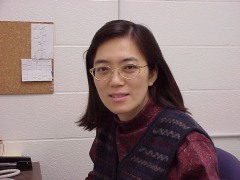Professor Yi-Fen Lee
The PhysOrg article Vitamin D protects cells from stress that can lead to cancer said
“By inducing a specific gene to increase expression of a key enzyme, vitamin D protects healthy prostate cells from the damage and injuries that can lead to cancer, University of Rochester Medical Center researchers report.‘Many epidemiological studies have suggested the beneficial properties of vitamin D,’ said Yi-Fen Lee, associate professor of urology at the Medical Center who led the research. ‘Our findings reflect what we see in those studies and demonstrate that vitamin D not only can be used as a therapy for prostate cancer, it can prevent prostate cancer from happening.’
Lee and her research team discovered one mechanism involving vitamin D that protects cells from oxidative stress. The vitamin D used in the study is 1,25-hydroxylvitamin D3, the most potent and active form of vitamin D in the human body. Nonmalignant human prostate epithelial cells also were used.”
Yi-Fen Lee, Ph.D. is Assistant Professor of Urology, University of Rochester Medical Center.
Her research focuses on:
- Anti-tumor effects of Vitamin D. Using prostate cancer as a experimental model to study the mechanisms of how vitamin D exerts its chemopreventive, anti-proliferative, anti-invasive, and anti-angiogenesis effects.
- Investigation of the combination of vitamin D and COX-2 inhibitor therapy in treatment. Her development of vitamin D-based therapy reduced the vitamin D treatment-mediated adverse effect, and enhanced the vitamin D efficiency in treatment of cancer.
- Aging: She uses TR4 knockout mice as a model to study the aging process, in which accumulation of unrepaired DNA damage results in acceleration of the aging process. Her study focuses on how cells response to oxidative stress, stress-induced DNA damage, and DNA repair to maintain genomic stability and longevity.
Yi-Fen coauthored Growth retardation and abnormal maternal behavior in mice lacking testicular orphan nuclear receptor 4, Disruption of TR4 orphan nuclear receptor reduces the expression of liver apolipoprotein E/C-I/C-II gene cluster, Modulation of the retinoic acid-induced cell apoptosis and differentiation by the human TR4 orphan nuclear receptor, Suppression of hepatitis B virus core promoter by the nuclear orphan receptor TR4, Androgen signaling is required for the vitamin D-mediated growth inhibition in human prostate cancer cells, and Convergence of two repressors through heterodimer formation of androgen receptor and testicular orphan receptor-4: a unique signaling pathway in the steroid receptor superfamily.
Yi-Fen earned her Ph.D. in Endocrinology at the University of Wisconsin in 1997.
